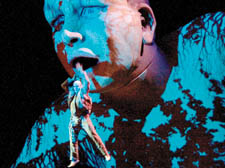|
|
 |
| |
| |
Superbly grotesque satire for our times
REVIEW: LE GRAND MACABRE
ENO Coliseum
A FABULOUS, riveting production of György Ligeti’s opera Le Grand Macabre at the
Coliseum re-confirmed the status of the English National Opera as the country’s most adventurous, exciting opera house.
Not many people like Ligeti’s opera when it is heard on its own in a concert or on a CD.
Dense chords, fast arpeggios, abrupt twists and turns, lines moving at different speeds, melodies coming and going amidst confusing rhythms hardly seem like music at all.
But placed in the context of the ENO’s brilliant production, Ligeti’s “micro-polyphony” music becomes quite acceptable.
Ligeti experienced the evils of Nazi rule and Communist despotism in his native Hungary and Le Grand Macabre can be seen as hilarious satire, making fun of the deficiencies of governments.
The production was put together by Catalan “total theatre” group La Fura Dels Baus.
The stage is dominated by a giant revolving figure of a naked woman with vast thighs and sagging breasts.
Her various orifices open and close so that singers can enter and sing from her eyes, mouth, nose, nipples and anus. In one ghoulish scene, her legs open widely and her stomach and intestines are transformed into a nightmarish hip-hop night club, complete with line dancers.
The extraordinary production succeeds in portraying the kind of land imagined by Ligeti as the setting for his satire about government leaders, the police and aristocracy, and attitudes to sex, alcohol and dieing.
Le Grand Macabre Nekrotzar, a cross between Mussolini and Charlie Chaplin, has returned from the grave to destroy the earth, and its destruction by a comet is prophesied by an astrologer.
Prince Go-Go sung by a counter-tenor is a splendid caricature of the caste of princes everywhere.
A late middle-aged woman with an insatiable sexual appetite chastises her husband for failing to meet her requirements.
By the end, of course, the end of the world is not nigh and everyone wakes up to enjoy a new world. All of the singers cope very well with Ligeti’s difficult music, particularly bass-baritone.
Pavlo Hunka as Nekrotzar, and conductor Baldur Bronnimann, make an excellent job of handling the difficult music.
|
 |
|
|
 |
|
|
 |
|








